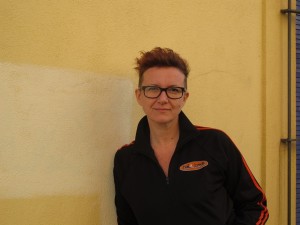Brigitte Vasallo es una firme defensora de los derechos de la mujer, de todas las mujeres, en los unos y en los otros rincones del mundo. Hija de migrantes y migrante por cuenta propia ha vivido parte de su vida en Marruecos, país que considera una de sus muchas matrias.
Por Adrián Solana, colaborador de AraInfo
Brigitte Vasallo es una firme defensora de los derechos de la mujer, de todas las mujeres, en los unos y en los otros rincones del mundo. Hija de migrantes y migrante por cuenta propia ha vivido parte de su vida en Marruecos, país que considera una de sus muchas matrias. Es escritora y periodista especializada en la construcción de diálogos interculturales. Integra el grupo Red Musulmanas de feminismo islámico y desde hace años lucha contra la prohibición del burka en el Estado español. Imparte talleres sobre relaciones amorosas con el título #OccupyLove y ha escrito el libro PornoBurka con el que pretende explicar el mundo en un lenguaje esperpéntico desde una perspectiva disidente.
Quienes defienden la prohibición del burka y algunas feministas occidentales consideran que el velo integral es vejatorio para las mujeres que lo utilizan ¿Está de acuerdo?
Precisamente ese no tiene que ser el tema del debate porque lo que yo opine sobre una prenda que no uso no tiene ningún tipo de importancia. El debate debería estar en torno a si es legítimo obligar o prohibir a una mujer vestirse de una manera determinada y si realmente nuestras prohibiciones u obligaciones no atentan contra el derecho al propio cuerpo y la propia imagen.
Entonces, el tipo de ropa que usa una mujer ¿no la puede hacer más o menos libre?
Por supuesto que no. Yo creo en lo que cada mujer como persona adulta, racional e independiente es capaz de hacer con sus circunstancias materiales. Por ejemplo, hace poco una compañera me explicaba que en Afganistán hay grupos de mujeres que hacen teatro social y están amenazadas, por lo que el burka les sirve para que no les reconozcan en la calle. El velo les da privacidad, así que eso de pensar que esta prenda es patriarcal y que las mujeres no tienen manera de redomarla es una mirada totalmente colonial.
La prohibición del burka ¿fomenta la construcción del odio hacia minorías religiosas?
En todo. Yo no considero que haya mucho más detrás de esto que precisamente una construcción de alteridad que no nos lleva a ningún sitio positivo. Las leyes se hacen para responder a una necesidad social, pero la prohibición del burka no es una urgencia pública. Este mensaje se lanza para hacer una cortina de humo sobre temas que son mucho más importantes y para criminalizar a según qué culturas y librar de culpa a otras. Sin embargo, en el Estado español llevamos 88 mujeres asesinadas este mismo año, lo que tendría que ser un escándalo de dimensiones astronómicas y no lo es.
Desde las sociedades occidentales a menudo intentamos dar lecciones a otros países sobre la libertad y la tolerancia. Por ejemplo, fue muy polémica las acciones que Femen realizó en su particular ‘Día Internacional de la Yihad Topless’, exhibiéndose desnudas de cintura para arriba delante de mezquitas y embajadas de países árabes. ¿Qué le pareció esta acción?
No solamente de una gran ignorancia, porque hay muchos países árabes que ni siquiera son totalmente musulmanes y también hay gente de otras religiones, si no de una gran estupidez porque esas mujeres a las que quieren ‘liberar’ también son musulmanas y van a las mezquitas. Fue un insulto decirles que no saben ser tan libres como Femen porque no enseñan los pechos. A mí me parece estupendo que enseñen los pechos pero también me parece perfecto que haya mujeres que se quieran cubrir. Desde organizaciones musulmanas y desde el feminismo islámico llevan tiempo denunciando que este tipo de campañas están desprestigiando el trabajo que las feministas realizan día a día sobre el terreno.
¿Por qué desde algunos sectores del feminismo occidental se establece una diferenciación entre las mujeres occidentales y las mujeres musulmanas, ‘nosotras y ellas’?
Aquí hay dos líneas interesantes. Una es la concepción lineal de la historia que parte de un conflicto universal donde la historia de la humanidad va desde la barbarie hasta la civilización; y entiende que Occidente es la vanguardia y que el resto van más despacio pero acabarán llegando aquí. Sin embargo, la evolución no es lineal y cada civilización tiene un entorno y un conocimiento determinado, situado en su historia y en su momento.
Por otro lado, es una falsa construcción distinguir entre las europeas y las musulmanas porque hay muchísimas musulmanas europeas. Se les está obligando a decidir entre dos identidades que no están en absoluto enfrentadas. Tenemos que plantearnos por qué siempre las pensamos como exógenas y que intereses hay detrás de ello.
Wassyla Tamzali, directora durante casi 20 años del Departamento de Igualdad de Género de la Unesco, rechaza el uso de todo tipo de velo y lo considera una práctica ideológica y social a combatir en el marco de la deconstrucción del patriarcado y sus atributos religiosos. Cómo dice Tamzali ¿considera que la deconstrucción del patriarcado pasa por la deconstrucción de atributos religiosos?
Estoy de acuerdo con que Wassyla Tamzali quiera combatir cosas, lo que no veo tan claro es que la prohibición sea la manera de combatirlas o trabajarlas. Además, me asusta mucho abrir la puerta a las prohibiciones de las decisiones de las mujeres sobre su propio cuerpo, como también ha ocurrido con el tema del aborto.
Las mujeres no podemos seguir retirándonos de los espacios patriarcales, porque no hay espacio que no sea patriarcal; si no que tenemos que ocuparlos y exigir nuestros derechos. Por ejemplo, la tan vitoreada democracia no nos permitió votar hasta hace cuatro días, pero no nos hemos retirado si no que la hemos ocupado. Entonces hay que despatriarcalizar y luchar todos los espacios, también los religiosos, y no creo que haya otra manera de acabar con esos atributos patriarcales.
¿Hay algún ejemplo de organización o empoderamiento protagonizado por mujeres musulmanas que considere referente?
Todas las luchas por el derecho a llevar el velo y el velo integral en Europa me parecen un ejemplo de los procesos emancipatorios propios de las mujeres musulmanas. El mensaje que trasmiten: “Decís que estoy sumisa a Dios por llevar velo y que queréis que me lo quite para estar sumisa al Estado”, me parece una reivindicación muy interesante sobre qué patrones queremos tener y qué patrones nos imponen. A mi esa me parece una reivindicación muy clara, que las mujeres musulmanas no necesitan que les digamos nada, sino que nos dejemos acompañar por ellas y nos acompañemos entre todas.
¿Cree que tanto la obligatoriedad de usar el burka en algunos países islámicos como su prohibición en Occidente tienen un propósito común que es la discriminación de la mujer?
Las dos ideas vienen de la misma concepción, que las mujeres no podemos decidir por nosotras mismas y que por lo tanto hay que hacer leyes que decidan sobre nuestro cuerpo y nuestra vestimenta, porque nuestro cuerpo y nuestra imagen siempre son una amenaza. Prohíben nuestra libertad y nos excluyen a través de leyes represivas.
¿Hasta qué punto las mujeres que usan el burka lo hacen obligadas?
Lo primero que se dice sobre el velo integral es que las mujeres lo llevan obligadas. Sin embargo, muchas mujeres dicen que lo llevan porque quieren e incluso en contra de la voluntad de su familia que no quiere ser estigmatizada. Otras en cambio afirman que lo llevan porque a su marido le gusta, pero que levante la mano la mujer que está libre de hacer cosas para gustarle más a su pareja. Lo que pasa es que estos procesos de violencia simbólica es más fácil verlos en los ojos de las demás que dentro del propio cuerpo y es más cómodo acusar a las demás al mismo tiempo que, por ejemplo, sometemos a nuestros cuerpos a procesos estéticos brutales.
¿Es el islam una religión que restringe especialmente las libertades de las mujeres, más que otras religiones como el cristianismo o el judaísmo?
En absoluto, ni más ni menos. Para empezar depende mucho de las interpretaciones que se hagan. Según las lecturas de las feministas islámicas el islam es una religión bastante igualitaria. Pero nosotros tenemos esa imagen del islam porque la islamofobia llega a lugares bastante insospechados. Por ejemplo, en las traducciones del Corán, la palabra ‘insan’ (persona) se traduce como ‘hombre’ genérico, entonces el machismo del lenguaje castellano pasa a incorporarse a un machismo en el Corán que en realidad no existe en el texto original.
El capitalismo puede fomentar medidas racistas para dividir a las clases populares y que pierdan de vista problemas de mayor magnitud ¿Cree que es el caso de la prohibición del burka?
Los procesos de lucha contra el burka siempre vienen promovidos por grupos políticos que nunca se han posicionada a favor de los derechos de las mujeres. Están creando una cortina de humo sobre problemas más importantes de urgencia social y consiguiendo apoyos de manera sorprendente desde los propios contextos feministas para aplicar violencia sobre algunas mujeres en nombre de las libertades de todas.
Es algo similar a lo que ocurre con el Pinkwashing (utilización de los derechos sexuales para lavar, ocultar, blanquear acciones o atropellos contra derechos humanos), cuyo paradigma es Israel, porque protege algunos derechos de la comunidad LGTBI, pero vulnera otros – por ejemplo la ocupación imposibilita la articulación de la comunidad LGTBI palestina -. Además, Israel, también presume de defender los derechos de las mujeres, pero según un estudio realizado entre el año 2000 y 2007, el 10% de las mujeres palestinas embarazadas fueron retenidas en checkpoints cuando iban a dar a luz. Pues eso mismo ocurre con la prohibición del burka, cuando con la excusa de defender los derechos y libertades de las mujeres se aplican violencias a unas mujeres en concreto.
Tomado de: http://arainfo.org/brigitte-vasallo-pensar-que-el-burka-es-patriarcal-y-que-las-mujeres-no-tienen-manera-de-redomarlo-es-una-mirada-colonial/#.V72EfXucPfA.facebook















 Users Today : 4
Users Today : 4 Total Users : 35460021
Total Users : 35460021 Views Today : 8
Views Today : 8 Total views : 3418639
Total views : 3418639